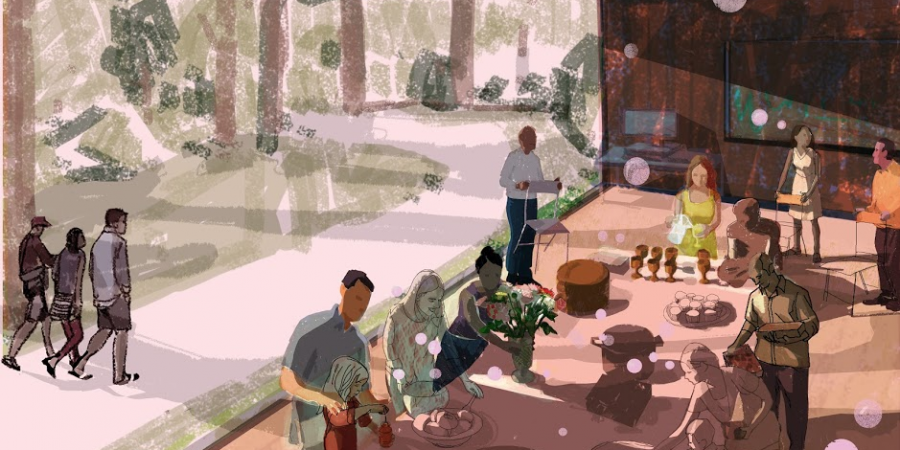
A CONVERSATION WITH CHRISTINE POHL
Christine Pohl’s writings on hospitality have influenced my own thinking and practices about life as a Christian living in community. Dr. Pohl generously shared her insights on the topic of hospitality in a thoughtful and inspiring conversation from which the following article was taken. —Miyoung Yoon Hammer
MIYOUNG YOON HAMMER: I would like to explore what it means to restore hospitality as it was intended to be practiced. With that in mind, I’m wondering if you could begin by talking about the origins of hospitality.
CHRISTINE POHL: I don’t think we can state definitively what the origin of hospitality is, because it’s a very ancient practice valued by most ancient cultures. Perhaps we could say that its origin is in human vulnerability, sociality, and longings for community. As a stranger a person is often vulnerable, and when they’re traveling, they’re very dependent on the kindness of other strangers, other people whose community they’re trying to enter. So I suspect that hospitality began as a form of mutual aid. Before there were hotels and restaurants and inns, everyone, whether they had resources or not, was dependent on the kindness of strangers when they were traveling. Everybody was, in a sense, vulnerable.
As a practice, hospitality was really important to human well-being. Oftentimes cultures associated it with their gods or with some understanding of the divine: that protection and provision for strangers was linked in some way to concerns about divine things.
I think the other early component to hospitality was almost always eating together. That’s a profound form of mutual recognition and respect for human relationships which, again, has its origins in human sociality—in being made for a community.
MYH: An assumption I have is that when we have to start teaching something explicitly that was once an organic part of our lives, it means there’s been a shift away from how things once were. Does our having to give instruction about hospitality and what it means to be hospitable suggest that it is something that has been lost and needs to be recovered?
CP: A practice like hospitality has to be talked about and taught in some ways, or “caught” at least, for the next generation to pick it up. It’s true that one of the reasons that we need more explicit teaching today about the history and practice of hospitality is because in many ways it has gotten lost, at least in US culture. People stopped telling the stories about it. What’s interesting historically is the number of stories woven through various traditions about the practice of hospitality: the surprise in who the guest turns out to be, or who the host is, or in the blessing associated with it. When people stopped talking about it, or took it for granted, or became too busy for it, the whole practice began to change. You can make an argument that many of the pieces of the practice of hospitality have endured historically but that it has stopped being a coherent whole—that we’ve lost the sense of the practice being located in a larger narrative.
MYH: A couple of words you have used to describe hospitality are mutuality and vulnerability, and that vulnerability necessitates hospitality. Perhaps, at least in Western American culture, while mutuality may be valued, vulnerability really isn’t.
CP: That’s true. We can protect ourselves from vulnerability if we’re middle class and have resources. We’re not nearly as dependent on the kindness of strangers as we used to be except in emergencies, when we again see hospitality played out in more traditional ways. People do want to show hospitality and not only in emergency situations—but the reality is that most of us today don’t depend on strangers if we’re traveling; we have hotel rooms and restaurants for that.
MYH: You’ve visited with a number of different faith communities and engaged in conversations about hospitality. In your book Making Room: Recovering Hospitality as a Christian Tradition you wrote, “Sustained hospitality requires a light hold on material possessions and a commitment to a simplified lifestyle.” Can you comment about this connection between holding lightly to material possessions and having a deeper sense of hospitality?
CP: Hospitality by definition involves welcoming people into a space that’s lived in—and some possessions are certainly helpful for people to be comfortable. But there is a certain irony in the reality that the more possessions one has, the more one can feel the need to protect and care for those possessions and thus be less willing to risk welcoming strangers into their context. That’s not always true, but it’s often the case.
What was notable among the faith communities I visited was the choice to live pretty simply. That can make it more comfortable oftentimes for the strangers who are being welcomed. Neither they nor the hosts have to worry about anyone harming possessions. People still care about their possessions, which is why I talk about a lighter hold rather than no possessions at all. It’s a complicated relationship: possessions usually make things more comfortable, but too many can actually make welcoming others uncomfortable and even unworkable as hosts become more protective.
MYH: Would you say that hospitality is a cultural tradition or a spiritual tradition, or is it both?
CP: It’s definitely both. Hospitality is practiced in every culture. Different cultures emphasize or treasure different aspects of hospitality, but almost all practice it one way or another.
It is interesting, however, how often hospitality is connected in some way to blessing and to God. Hospitality is certainly foundational in the Christian tradition, but it is decidedly also spiritual in its connection to mystery—to the presence of God or angels—so it’s very much a spiritual tradition that is often linked to blessing. In the stories involving hospitality in the Old Testament, blessing is very frequently present. Strangers turn out to be angels, or guests bring good news, or they offer the promise of a longed-for child. Ultimately hospitality is very much both a cultural and a spiritual practice.
MYH: When it comes to hospitality, we more often think about what the host is giving. But you’re talking about what the stranger has to offer.
CP: It goes both ways, and that’s part of the mystery and the wonder of it. In the Christian tradition, hospitality is connected to Jesus being both guest and host to us. Something that stood out to me in talking with practitioners of hospitality—and resonated with my own experience of welcoming refugees and people who are homeless—was that we so often go into these interactions thinking that we’re the one who is providing the benefit, the help, the care our guest needs. In fact, it is the guest who brings the blessing. My life has been changed through these kinds of interactions. You do really have a sense that you’re standing on holy ground when you’re interacting with strangers. It can be quite a remarkable thing.
Today hospitality is generally understood more as a duty to welcome others, but that differs from the early Christian understanding, which was a much richer one. The tradition of hospitality in those times was so powerful because there was an assumption that there would be blessings for everyone, both host and guest. Not that it wasn’t also difficult or risky at times, because it was. But the expectation that God would be present was very strong in the earlier centuries.
MYH: How did we lose hospitality as a core part of our tradition? While very much alive and explicit in some Christian communities, as a tradition it seems to have been lost in the greater church community. What story do you tell about that loss?
CP: It is a complicated story with cultural, political, and socioeconomic components to it. Hospitality, as a robust practice, has often been associated with an earlier period when social and economic arrangements were different. My work has focused on tracing a very Western understanding of hospitality—starting in my own context and then looking back historically. The story would be traced out a little differently for other cultures around the world.
In the West around the modern period, hospitality stopped being, in a sense, as useful as it had previously been. It wasn’t seen as a particularly helpful way to meet the needs of people anymore, especially as there were more and more needy individuals disconnected from communities. It also increasingly was misused as a way of reinforcing power and privilege. By the time we got to the Reformation, the reformers were more hesitant to see the value of hospitality in the church. We still recognize it of course, and Calvin is particularly eloquent about the importance of hospitality toward refugees. But older trajectories of hospitality—crossing social boundaries, building community, offering respect to people different from yourself—got lost. One of the stories I tell in my book is about John Wesley in the 18th century, who for the most part recovered the activities and practices associated with hospitality but didn’t ever call it hospitality, because by that time, the word “hospitality” was associated with a very different set of commitments and activities.
MYH: If not hospitality, what did he call it?
CP: He didn’t call it anything; he just did it. He even talked about how these acts were recovering ancient traditions, but he talked about it in terms of having small groups in homes or making a place for strangers, even forming a “stranger’s friend society.” All of the practices were there—for example, church leaders sharing meals with widows and orphans—but without the vocabulary of hospitality, and if you don’t use the vocabulary, it’s harder to connect it with the ancient tradition. So it’s a bit of a complicated story. The tradition endured more visibly in the Catholic church, particularly through the Catholic Worker Movement, which was connected to a Benedictine monasticism that never really lost its connection to historic hospitality.
MYH: Why is it important to restore hospitality as a Christian tradition?
CP: It’s fundamental to our identity and our lifestyle as Christians. It’s what makes us distinctive, because Jesus called us to a particular kind of hospitality that welcomes those who often, on the face of it, don’t seem to have as much to offer. When Jesus says in Matthew 25 that in welcoming the stranger or the needy person we might be welcoming him, and when he says in Luke 14 that when we give dinner parties, to invite not friends and family but the poor and the lame, he’s talking about inviting people who are usually excluded and seeing them as an important part of our lives and our communities. That’s a distinctive understanding of hospitality. Along with that is the possibility of blessing: that we might be welcoming Jesus, and that clearly God is our host.
Christian hospitality flows out of a life of gratitude. We’ve been welcomed into fellowship with God, and that welcome came at a huge cost. The connections between gratitude and hospitality, between God’s welcome and our welcome, feed and undergird the Christian life. Losing track of hospitality means we have lost a very beautiful and life-giving practice—often difficult, but beautiful and life-giving.
MYH: Would you say that hospitality ought to look different when it is lived out by Christians as opposed to non-Christians?
CP: I think it ought to look distinctive because of Jesus’ identification with the least of these. In the historical Christian tradition there was significant teaching that we shouldn’t use hospitality instrumentally, to gain advantage. It shouldn’t be what the early writers called “ambitious hospitality.” We should give it as a response to the welcome that we have received—and to that extent, it is a distinctive kind of hospitality. We should be willing and interested in truly making room, especially for people who don’t usually have a place.
MYH: Concerning the broader social landscape, you have written about the power of recognizing and acknowledging others, and the role of hospitality in respecting the dignity and equal worth of every person and transcending social differences. As we consider the power of recognizing, how are Christians called to live out hospitality in the face of challenging and important social issues such as immigration, same-sex marriage, and racism?
CP: The first move on the part of a Christian should be in the direction of welcome. It’s not the only move, but hospitality as a tradition challenges us. It’s a helpful framework for thinking about some of these issues. It also functions as a warning because Christians haven’t always done very well on these things.
For me, hospitality means our impulse is going to be to love as God loves, to welcome as God welcomes. This posture, of course, doesn’t address all of the issues that come up with the challenges we’re facing today. Hospitality is complex and not the only practice that Christians have to take seriously, but hospitality helps us think about the power of dynamics, the recognition issues, the guesthost relations.
There is, though, a tension between welcoming strangers and maintaining identity and community—a tension that’s never fully resolved. It is actually traceable right back to covenantal understandings of faithfulness. Hospitality, at least, helps us name some of the challenges we face and reminds us that when people’s basic well-being is at stake, our call is to make room, to offer welcome.
Some see hospitality as the full answer to these challenging issues, but I don’t believe that hospitality alone can be our response. Other practices such as fidelity and truthfulness are critical as well, and sometimes they interact in a complex way with hospitality. Most significant of all, to me, is gratitude: hospitality becomes grudging and distorted if it does not flow from a life of gratitude. Committing to a tradition of hospitality grounded in gratitude, it seems to me, would take us a long way down the road toward faithfully responding to God’s love—as we recognize the value in every human being and come together with respect, integrity, and truth.



